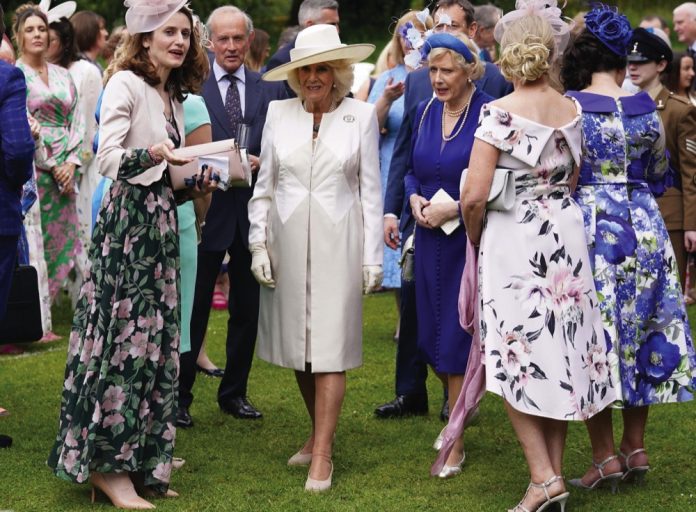
HER MAJESTY THE QUEEN WILL ATTEND THE FOREIGN PRESS ASSOCIATION AWARDS
Monday 20th November 2023
The Queen will celebrate 135 years of the Foreign Press Association (FPA) at the annual FPA Awards at the Sheraton Grand Park Lane, London.
Her Majesty will be received at the Sheraton Grand by the Lord Lieutenant of Greater London, Sir Ken Olisa. The Queen will then be welcomed to the Foreign Press Awards by Deborah Bonetti, Director of the Foreign Press Association and Dagmar Seeland, President of the Foreign Press Association.
In the Tudor Rose Room, Her Majesty will meet the FPA Committee (comprising international journalists), the judges and the 33 nominees in every journalism category at the awards. A group photograph will be taken of Her Majesty and the nominees.
The Queen will then join the ceremony in the Ballroom, where she will give a keynote address and be presented with an Honorary Membership of the Foreign Press Association, before departing.
His Majesty The King attended the awards as Prince of Wales in 2008 and is an honorary member of the FPA.
The Foreign Press Association in London is the oldest and largest association of foreign correspondents in the world and was founded in 1888. Back then, news of Jack the Ripper travelled abroad and a group of journalists (mainly for Europe) arrived in London, attempting to cover the case. Finding it difficult to find their footing in a new and difficult city, they decided to join forces to gain access to sources and news, and so the FPA was founded. It now counts over 500 full members and is a member of the UK Press Card Authority, giving out more than 2,200 press cards a year to foreign journalists working in the capital.
It holds its annual awards gala (the FPA Awards) once a year, in November. It is the only awards ceremony of its kind that puts together domestic and international journalism. The approximately 360 guests are mainly journalists (both British and international) and nominees for each category of the awards.
There are 12 categories:
1. FPA Member Story of the Year
2. Environment Story of the Year
3. TV News Story of the Year
4. Print & Web Story of the year
5. Radio/Podcast of the Year
6. Travel/Tourism Story of the Year
7. Financial/Economic Story of the Year
8. TV Documentary Story of the Year
9. Arts & Culture Story of the Year
10. Thomson Foundation Young Journalist of the Year
11. Science Story of the Year
12. City University Story of the Year
The final category is Journalist of the Year and it’s picked out of the 12 winners above.
The FPA has just started a new partnership with City University to help raise a new generation of Foreign Correspondents and the winner of this new award will receive membership to the FPA for a year. Working with City, the FPA has also begun the process of inventorying its extensive archive, with the aim to set up the first Foreign Press Association Museum in the world.
The Queen’s speech at the Foreign Press Association Awards 2023
Ladies and gentlemen, it is a huge pleasure to be here with you this evening to celebrate the 135th anniversary of the Foreign Press Association and to reflect on your many achievements as the world’s oldest and biggest association of foreign journalists. But I cannot begin without also reflecting that as we gather, journalists, photographers and their support teams are even now risking their lives. We think particularly of those reporting from Ukraine and the Middle East in these most difficult of times.
By joining you this evening, I am following in the footsteps of my husband, an honorary member of the FPA, who joined you at these Awards in 2008. On that occasion, he described your role as “not only to look at the world and study the way it works, but to report what you see accurately, to explain it and indeed to interpret it. In so doing you shape the view and define the perspective of millions of people and that is an enormous responsibility”.
I know, second-hand, a little of the responsibility of your profession. There are journalists in my family…and I have even been the subject of one or two stories myself over the years… I have also had the opportunity to visit a significant number of newsrooms and have seen how tough your work is. Particularly, if I dare say so, for women, who, despite the many hurdles they have faced, have been among the bravest reporters of all. From trailblazers like Martha Gelhorn and Christiane Amanpour, to those such as Marie Colvin (an FPA Journalist of the Year) and Daphne Caruana Galizia, who have so tragically paid with their lives, their courage was matched only by their conviction that the truth matters. Perhaps this has never been more evident than in our digital age, where disinformation runs rife and where female journalists are increasingly targeted on social media. The FPA has done much to promote and protect women throughout your long history, appointing your first female President in 1955, and, more recently, providing specialised training for women to deal with disruptive and abusive behaviour from members of the public. For this, all your readers and broadcast audiences are in your debt.
As the late great Dame Ann Leslie wrote, it is among the sacred duties of journalists to ‘face the glacier in the cupboard and to expose its coldness and cruelty to the bright, clear and humanising light of day.’ That is what she, and all of you, do. This is especially true in one area of your work for which I should particularly like to thank you: raising awareness of domestic and sexual abuse against women in every part of the globe. The FPA was, of course, founded in 1888, when foreign correspondents came to the United Kingdom to report on the Jack the Ripper murders and decided to band together to secure better access to information and sources. Although we might now deplore some of the more sensational approaches to those terrible events, the fact is that the FPA grew out of the need to reveal and condemn violence against women. And this remains a key part of journalism today. You have the ability to break the corrosive silence that frequently surrounds abuse. You bring into the open the voices of victims, you break taboos, you shine a light on these heinous crimes and you guide the public on what they can do to help. As the foreign correspondent Christina Lamb makes clear in her devastating book ‘Our Bodies, Their Battlefield’, rape and sexual abuse continue to be a pervasive and all-too-often hidden feature of conflict zones the world over.
Ladies and gentlemen, as my husband observed 15 years ago, yours is an awe-inspiring responsibility: you question, debate and analyse and thus protect what is so easy for us to take for granted – true freedom of expression. As I said at the London Press Club Awards in 2011, I believe freedom of expression to be at the heart of our democratic system. In this, you play a vital, if not pivotal role.
Take courage from the words of one of our greatest writers, and former journalist, Tom Stoppard: “I still believe that if your aim is to change the world, journalism is a more immediate short-term weapon”. May you continue to use it wisely. Thank you.
"Ladies and gentlemen, yours is an awe-inspiring responsibility: you question, debate, analyse and thus protect what is so easy for us to take for granted – true freedom of expression.”
— The Royal Family (@RoyalFamily) November 20, 2023
This evening, The Queen gave the keynote speech at the Foreign Press Association Awards in… pic.twitter.com/aiVzsK0oSD









